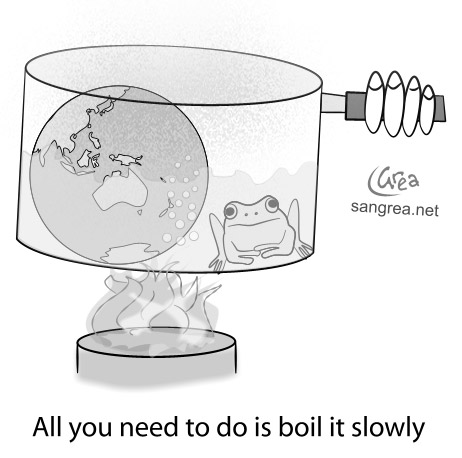
Dana's Global Warming Causing Heat Fatalities garnered a goodly number of heated comments by SkS readers and authors this past week. John Cook's ABC documentary demonstrates the how and why of climate denial drew the second highest number of comments. A "must see" video of Naomi Oreskes is embedded in it. Levitus et al. Find Global Warming Continues to Heat the Oceans by Dana rounded out the top three comment generators of the week.

Source: Royalty Free Cartoons
"We have tended to look at climate change, food security and poverty challenges separately. We know that 60% of our people live in rural areas, we also know that 90% of our rural population depend on agriculture; most important of all, we do know the future climate predictions give a much more uncertain climatic condition for agriculture, with potentially devastating negative consequences.
"We also know that the situation in my country is not peculiar to us; the situation is the same for the whole of SADC and Africa in general. It is for this reason that my government attaches great importance to this initiative we are launching."
Dr John Phiri, Zambia's Minister of Education, Science, Vocational Training and Early Education
Source: "Southern Africa: Region Most Affected By Climate Change", Nambia Economist posted on AllAfrica.com, Apr 27, 2012
Should a prohibition against the "hijacking of a comment thread" be incoporated into the SkS Comments Policy? How would you define "hijacking"?
Insolation: The amount of solar radiation reaching the Earth b ylatitude and by season. Usually insolation refers to the radiation arriving at the top of the atmosphere. Sometimes it is specified as referring to the radiation arriving at the Earth’s surface. See also: Total Solar Irradiance
Total solar irradiance (TSI) The amount of solar radiation received outside the Earth’s atmosphere on a surface normal to the incident radiation, and at the Earth’s mean distance from the Sun.
Reliable measurements of solar radiation can only be made from space and the precise record extends back only to 1978. The generally accepted value is 1,368 W m−2 with an accuracy of about 0.2%. Variations of a few tenths of a percent are common, usually associated with the passage of sunspots across the solar disk. The solar cycle variation of TSI is of the order of 0.1% (AMS, 2000). See also Insolation.
Source: Annex I (Glossary) to Climate Change 2007: Working Group I: The Physical Science Basis, IPCC Fourth Assessment Report.
A complete listing of the articles posted on SkS during the past week.
A list of articles that are in the SkS pipeline. Most of these articles, but not necessarily all, will be posted during the week.
If you think Renewable energy is too expensive, Richard Alley begs to differ.
John Cook had articles related to the ABC documentary I Can Change Your Mind about Climate published in ABC News and The Conversation.
Potsdam Institute for Climate Impact Research (PIK) was founded in 1992 and currently has a staff of about 300 people. The historic buildings of the institute and its high-performance computer are located on Potsdam’s Telegraphenberg campus. The institute is a member of the Leibniz Associationand receives core funding of about 10 million euros from the German federal government and the Federal State of Brandenburg. A similar amount of additional project funding is raised from external sources in competition with other institutions, a large part coming from grant programmes of the European Union.
At PIK, researchers in the natural and social sciences from all over the world work closely together to study global change and its impacts on ecological, economic and social systems. Researchers examine the earth system's capacity for withstanding human interventions and devise strategies and options for a sustainable development of humankind and nature. Interdisciplinary and solution-oriented approaches are a distinctive characteristic of the institute.
Research at PIK is organized in four Research Domains: Earth System Analysis, Climate Impacts and Vulnerabilities, Sustainable Solutions and Transdisciplinary Concepts & Methods.
PIK generates fundamental knowledge for sustainable development primarily through data analysis and computer simulations of the dynamic processes in the earth system, but also of social processes. PIK members publish their research findings in international publications and advise policymakers in Germany and abroad. In addition to the Federal Government of Germany, the European Commission and a number of other governments, international organizations like the World Bank also benefit from the institute´s expertise. Through institutions like the Climate-KIC (Knowledge and Innovation Community) of the European Institute of Innovation and Technology (EIT), whose German branch was founded with PIK support, the institute is in continuous exchange with the business community.
Understanding climate change and its impacts is a huge task that no institution or country can tackle alone. PIK is part of a global network of scientific and academic institutions working on questions of global environmental change. PIK plays an active role in activities such as the Intergovernmental Panel on Climate Change (IPCC), also known as the world´s climate council, whose working group on the mitigation of climate change is coordinated by PIK researchers. PIK initiated and has co-hosted the biennial Nobel Laureate Symposium on questions of global sustainability since 2007.
Posted by John Hartz on Monday, 30 April, 2012
 |
The Skeptical Science website by Skeptical Science is licensed under a Creative Commons Attribution 3.0 Unported License. |